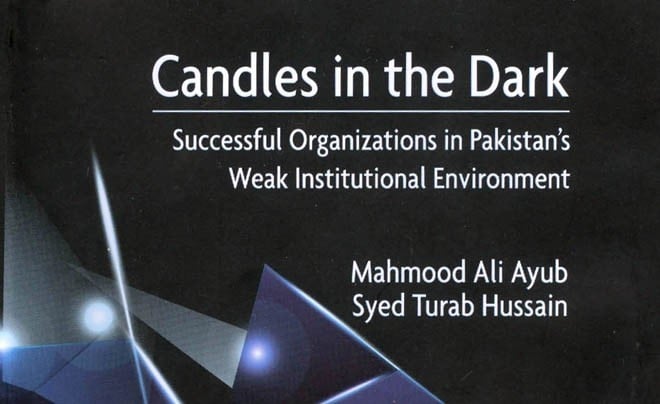
A book that attempts to explain how institutions can survive and flourish in a hostile environment

Pakistan’s weak institutional environment is a big hurdle in the development of institutions, both in the public and the private sector. Nevertheless, there are some organisations that refuse to be cowed down by adverse circumstances. They cross the hurdles with the help of a clear vision, minute planning, and careful executions of those plans. At the same time, there are also organisations that don’t dare to think out-of-the-box and become a victim of the ups and downs in the development and governance sectors, never challenging the status quo.
Set in this backdrop, the crux of the book Candles in the Dark: Successful Organizations in Pakistan’s Weak Institutional Environment is an attempt "to explain how some entities can survive and flourish in an institutional environment that is both fragile and hostile." And that has been ably undertaken by the authors in the shape of case studies of nine successful organisations, cutting across all major sectors, which have played and are still playing a considerable role in shaping the present and future contours of the nation and society, be it in terms of education, health, or charity initiatives.
So, how and why some Pakistani organisations are doing well despite the hostile environment? Interestingly, the basic question that the book asks is "not whether successful agencies can exist in problematic environment, but what conditions make that possible."
The book also makes some nice references to the work of foreign authors on this issue, such as Peters and Waterman, who enumerate "eight common features of the chosen corporations that made them successful."
The focus of the book remains with the reader throughout, from one chapter to the other. The first two chapters set the tone of the book and compel the reader to ask questions and seek answers about which institutions are we precisely talking about and why. The answers are both satisfying and thought-provoking.
A review of the case studies, which includes prestigious institutions and laudable public services, such as Lahore University of Management Sciences (LUMS) and Rescue 1122 respectively, enables researchers as well as general readers to see how dedication and perseverance can bring success to an institution otherwise surrounded in multiple problems.
In a way, case studies can also be seen as a comparative analysis of how organisations respond to different obstacles in different organisational and working environments. The case study on each institution is deeply researched, providing a historical perspective and valuable data on the current status.
The book first defines success in three aspects: results, legitimacy, and sustainability/reliance. It then broadly measures each institution keeping in view these factors.
The chapters are interesting read as they raise questions and engage the reader with their simple but intellectually profound analysis. The authors rightly point out that the fruits of progress in selected areas of institution building during the last decade, such as an active judiciary and empowerment of the legislature in the shape of the 18th Amendment, have not filtered down to the poor.
The chapter on the general determinants of success hits the nail on the head and is highly recommended to students, public policy makers, and academics. By listing the necessary ingredients that make an organisation successful, the authors make the book helpful for someone striving for an organisation to make a turnaround or someone who is looking for a reliable solution. Some chapters in the book point to weak governance and a gradual decline in the institutional capacity of the country.
While the first two chapters and the nine case studies give the gist of what the book is all about, the last four chapters put things in their proper context; that is: why things are as they are. While "The story of failing institutions" gives a wake-up call to all the stakeholders in the public and the private sector institutions, "Remaining issues and challenges" and the "conclusion" give us important advice on what should be done to put things on the right track. Also, the notes, references, and index are significant points of reference and knowledge. The book is a valuable addition to the very limited material available on the issue.